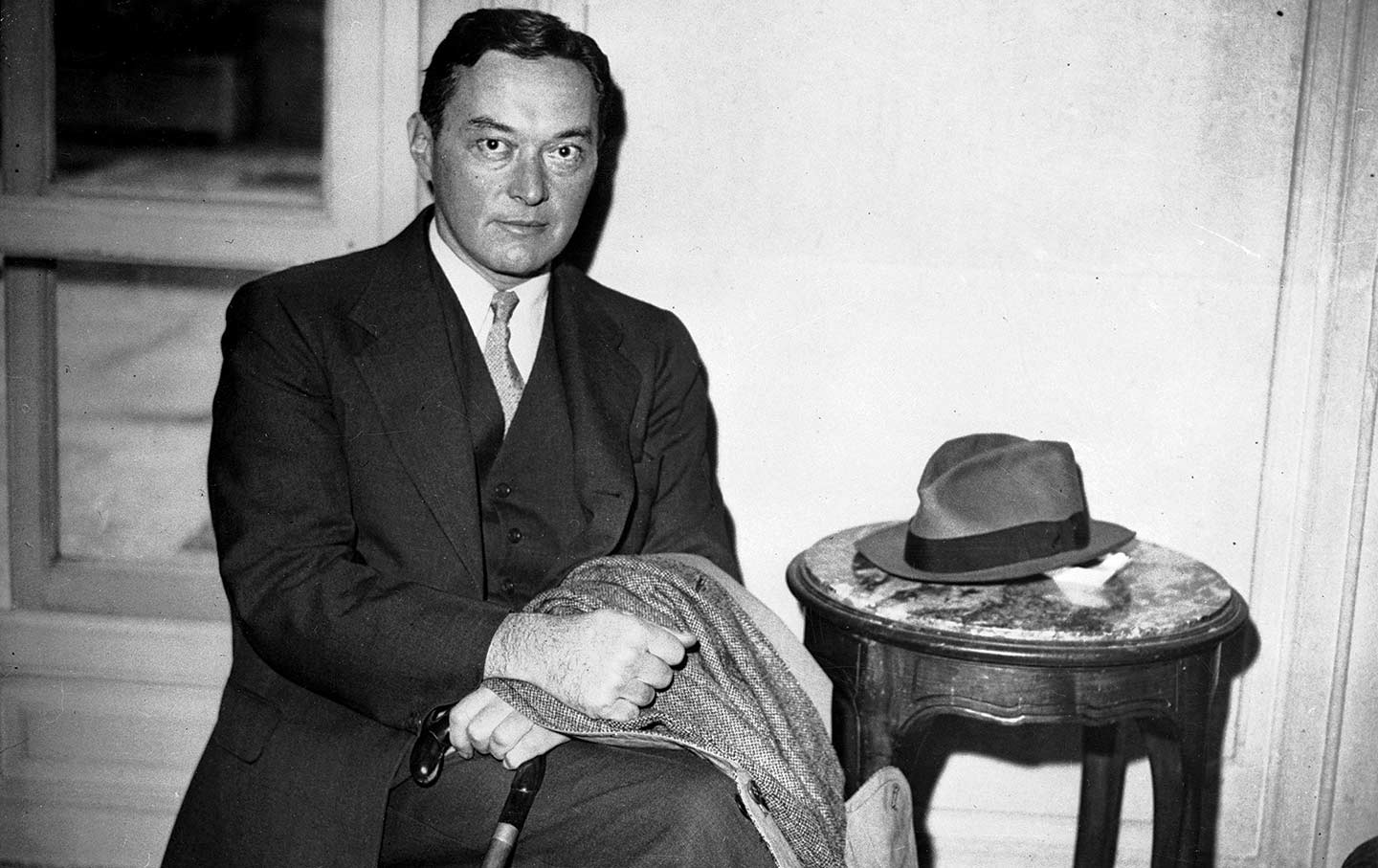The former Paris Review editor was ostracized over sexual harassment allegations. Now he’s editing a divisive, right-wing Jewish magazine. What’s going on?
Lorin Stein, then-editor of The Paris Review, speaks during the Paris Review Spring Revel gala in New York, on Tuesday, April 3, 2012.
(Amanda Gordon / Bloomberg via Getty Images)
You can tell almost everything you need to know about Tablet’s new monthly print magazine from its ads. The back cover of the first issue, published in June, features three torpedoes crashing through the waves. “Command the sea command the world,” the ad declares. And, in smaller letters, “Rebuild the arsenal.” It’s selling Anduril, the Peter Thiel–seeded defense contractor with an Elvish name from The Lord of the Rings that translates to “Sword of the West.” Between the covers, the ads tend more toward culture war than military hardware. They include products like the transphobic athletic clothier XX-XY (which calls itself “the only brand with the ovaries to stand up for women’s sports”); “Pirate Wires,” a newsletter by Thiel protégé Mike Solana; the Dimes Square right’s favorite fashion designer Elena Velez; and new CBS News editor in chief (and former Tablet writer) Bari Weiss’s University of Austin (“Come to a school that doesn’t hate you”).
Most of the stuff in between the ads is likewise mindlessly provocative. A sidebar features a meme showing Osama bin Laden saying, “I have done nothing wrong, ever, in my life,” and the 79-year-old actor Henry Winkler, labeled “Gen Z on TikTok,” responding, “I know this and I love you.” The front of the book has a piece interviewing Javier Milei fans in Argentina and an essay from a former columnist at Compact, the Soros foundation and Thiel–funded illiberal online magazine, with a paper-thin argument that intelligence agencies could be funneling very online young men into a “Nazi-satanist” cult as a way of besmirching the right. The feature well has a piece on Bill Gates’s influence in Africa. The provocations in subsequent issues are slightly more subdued—ads for the potter and interior decorator Jonathan Adler have replaced Anduril on the back covers—but the tone remains.
But perhaps the most effective provocation in the new magazine is the presence of executive editor Lorin Stein on its masthead. Stein’s resignation as the editor of The Paris Review in 2017, after he admitted to abusing his position to initiate sexual relationships with interns and writers, was one of the high-water marks of the MeToo movement in media. The Paris Review moved on, hiring a new editor and a new staff that was, for a time, made up almost entirely of women. Stein receded from view. His appointment as the man overseeing Tablet’s print efforts, under editor in chief Alana Newhouse, marks his return from the wilderness.
Many of Stein’s former colleagues are flabbergasted. “My first reaction was, ‘How is this a good business decision?’ Because there are hundreds of people in New York City qualified for that job,” said former Paris Review intern Matthew Frye-Castillo. “But then the more I thought about it, and the more I looked into Tablet, and it seems increasingly conservative, maybe that’s the point. His editorship reflects the rollback of DEI and MeToo. So in that sense, if you want to rebuke MeToo as this overly fussy movement, then Lorin Stein would be the perfect candidate.” (Tablet’s spokesperson declined interview requests on behalf of Stein and Newhouse and declined to review written questions, citing an as-yet-unpublished exclusive they’d granted The New York Times.)
Stein’s is the latest in a series of MeToo media comebacks. Semafor has been trumpeting former ABC News political director Mark Halperin’s “return to influence,” after CNN reported that he had sexually harassed five women, with his YouTube show 2WAY; former New Republic literary editor Leon Wieseltier, who apologized for his “offenses” after staffers accused him of sexual harassment, is presiding over a literary scene in DC around his journal Liberties; and I’ve seen younger TV types at an Esquire party flocking around Charlie Rose, who was fired by CBS after eight women told The Washington Post that he’d sexually harassed them.
“A lot of people are making their comebacks in a really surreptitious way. There isn’t an overt discussion that they’ve had about their past behavior or how they’re thinking differently about their work or about their relationship to women or employees in the workplace,” said Alexandra Kleeman, a novelist whose first published piece was in Stein’s Paris Review. “For someone to take on a similar role to the one in which they created a harmful working environment, and to do it without that sort of reckoning, sends a really specific message about what kind of behavior may be condoned, explicitly or implicitly. It’s a statement that abuses of power are tolerable again.”
For people who worked under Stein at The Paris Review, his new position inspires concern for Tablet’s staff. “Working with him was awful a lot of the time,” said one former staffer who asked to remain anonymous so they’d have a chance to move on with their life. “The idea of him being in charge of a staff again, I wouldn’t want it.” They recalled a charged office environment. “You can see it a lot in what he chose to publish: There’s an obsession with sex. That extended to conversations with people in the office. It extended to the way he behaved. It infused the entire atmosphere of The Paris Review,” they said. ”It wasn’t just the sexual harassment, it was the way that he treated people. He made comments to women in the office. There was a young staffer that was going to meet a writer and he told her to put on some lipstick. Comments that taken alone never seemed like very much, but it was death by a thousand cuts.”
When the “Shitty Media Men” list began circulating with allegations of assault and workplace harassment against Stein in 2017, staffers heard a ring of truth. “Most, if not all, felt that some of what he was being accused of was true and knew what the environment in the office was like,” said the anonymous staffer. They weren’t too surprised when The New York Times reported that he’d nonconsensually slid his hand up a woman’s skirt at a work dinner. (Stein did not share his perspective with the Times on that story.) Before his resignation and the Times story, Stein didn’t discuss the list with them, but he took action to respond to its challenging optics. “Sometime after the list came out, a reporter called for comment, and Lorin had an intern call him back with a prepared statement,” recalled the staffer. “It was deeply uncomfortable. To ask interns to speak for him?”
For some, Stein’s apology to The Paris Review board felt like enough. “This was a major fuck-up, but he owned it and he acted appropriately: He resigned,” said longtime board member Jeanne McCulloch, noting that she was speaking for herself and not the board. “He resigned before the investigative team at Debevoise & Plimpton had to come into the office to tell us the results, chapter and verse, of their investigation. Now, whether the timing of his resignation had to do with that or not, I have no idea, but if it were me, it certainly would.” Others felt Stein’s apology fell short. “After he resigned and came back to the office, he said to everyone, ‘I’m sorry to be leaving you like this.’ It wasn’t an apology, it was narcissism,” said the anonymous staffer. “What has he done to make amends? Does he even think he really did anything wrong? What kind of assurances would a new staff have?”
Stein found several less public ports of call after departing The Paris Review. In 2022, he started a book imprint for the New York bookstore chain McNally Jackson, angering staff, though associate publisher Nathan Rostron became the face of the imprint. “I think I might take a more kind of European approach to justice,” the chain’s proprietor, Sarah McNally, explained in a New York magazine profile. In 2024, New York University canceled a graduate journalism class that Stein was set to teach after a student publication reached out for comment. Tablet, however, appears not to mind the controversy.
McCulloch, for her part, is delighted to see Stein back in an editor’s chair. “I missed him a lot when he left, to be honest, because I did feel that he had the vibe that was very much The Paris Review vibe. I’m talking professionally here, not personally,” she said. “I would assume that any magazine that would hire him right now has done a deep dive into this incident and yet also saw his talents.” However, others feel that Stein’s decision to work at Tablet sheds new light on the way he left The Paris Review. Stein’s apology had seemed sincere to Frye-Castillo, but now, he says, “I wonder, someone who really felt the gravity of their actions, would they move to a conservative magazine like Tablet?”
In some ways, Stein’s alliance with Tablet is puzzling. Though Tablet once had a reputation as an open-minded online Jewish publication, in recent years it has shed contributors who became uncomfortable with its increasing right-wing partisanship. “They began to shift politically, and this led to more and more friction between the editors and me,” said former critic at large Paul Berman. “We had serious disagreements about the nature of reality, or what is a fact.” Notably, Tablet has taken the hardest of hard lines when it comes to Israel’s brutal war on Gaza. A feature in the October issue, for instance, criticizes Israel’s military for not being aggressive enough against Palestinians and forgetting that it “needed to take and hold territory to defeat their enemies.” Former Paris Review staffers I spoke with couldn’t recall Stein ever taking an interest in politics, so landing at such a political magazine didn’t seem like a natural step. Had his experience of cancellation driven him to the right? Former Tablet contributing editor Daphne Merkin, who was also discomfited by the magazine’s rightward drift, suggested a more practical explanation: “He needed a job, maybe.”
Popular
“swipe left below to view more authors”Swipe →
It’s likely that Stein is making plenty at Tablet, which has more monetary resources to draw on than The Paris Review. (“Why do these guys have to come back into positions of seniority?” asked former Paris Review intern Arthur Holland Michel. “Why can’t he just be like an associate editor?”) According to the most recent filings by the nonprofits behind each magazine, for 2023, an executive editor at Tablet had a salary of $219,800, while Emily Stokes, Stein’s successor as editor of The Paris Review, made $204,366. Newhouse had a salary of $517,000. That year, Tablet’s reported revenue, $8.44 million, 93.9 percent of which came from contributions, was more than twice The Paris Review’s. And it’s only likely to increase. This September, the National Endowment for the Humanities presented its largest-ever grant—$10.4 million—to the conservative Zionist Tikvah Fund, on whose board Tablet’s 2023 board president and vice president both sit.
But Stein’s compensation is not only remunerative. Tablet is a venue that has tried to shift the conversation around MeToo since the movement’s high point. Merkin, who has maintained friendships with Wieseltier and Woody Allen, and wrote a 2018 New York Times op-ed in which she rolled her eyes at the “reflexive and unnuanced sense of outrage that has accompanied this cause from its inception, turning a bona fide moment of moral accountability into a series of ad hoc and sometimes unproven accusations,” recalled conversations with Newhouse in which they shared their similarly mixed feelings. When Stein resigned from The Paris Review, Tablet ran a piece by Wesley Yang that effusively praised his editing while saying that he should have foreseen the consequences of his behavior toward women.
Though no one has accused Tablet of creating a sexist environment like Stein’s Paris Review, it could be messy in its early years. Ari Brostoff began working at Tablet around the time it took on its current name in 2009. Pleading naïveté, they noted it was one of their first jobs out of college. “Before I realized how extreme it was going to become politically, it became clear to me that there was something pretty extreme going on at the workplace level,” they said. “Personal boundaries were not encouraged. It sometimes felt like a reality show where [Newhouse] was going to be Andy Cohen—like people were being set up against each other, but also this sense of, ‘If you stick with me, you’re gonna win everything.’” Like Stein, who married Paris Review contributing editor Sadie Stein in 2015, Newhouse married one of the editors working under her. “She hired David Samuels and, as I remember it, started having a pretty public relationship with him in the office,” Brostoff said.
That consequence-conscious, but ultimately permissive, attitude has been evident in issues of the print magazine Stein oversees. The September issue, for instance, contains an essay by the psychoanalyst Erica Komisar titled “Guilt Is Good.” It argues that “modern society has rejected personal responsibility, replacing it with personal freedom—at any cost. That was a mistake.” At the same time, Komisar denounces the responses cases like Stein’s have generated. “When healthy guilt is dismissed, call-out culture becomes a race to publicly destroy rather than privately reflect, undermining genuine accountability,” she writes. “Online environments that prize instant outrage over introspection reward impulsivity at the expense of careful moral reasoning. This trajectory is not just a personal issue but a societal one, weakening the bonds of empathy that sustain civil discourse and community life.”
A review in the July issue of two debut novels, Sophie Kemp’s Paradise Logic and and Sophie Madeline Dess’s What You Make of Me, offers a more disturbing reflection of a continuing confusion over gender relations. Selectively quoting a portion of an essay Kemp wrote about the rot of contemporary masculinity, in which she mentions moments where she falls prey to these currents—“There was one time recently when I was wearing a prom dress at a bar and I let a man say something despicable to me and I liked it. Because I am exhausted by a certain kind of politics around consent. So are many other women that I know. It becomes very easy to backslide into this way of thinking, dangerously so”—reviewer Sheluyang Peng argues that men might be justified in continuing to misbehave. “Right before she finishes her passionate tirade against these misogynistic male influencers, Kemp—an Oberlin grad!—validates every single point those influencers make about female nature,” he writes. “How can you ‘deradicalize’ yourself after reading that? Are you supposed to?”
Kemp was unamused by this willful misreading. “Instead of making a frankly incoherent argument about the perceived gender politics in my work,” she told me, “I wish that the editors and writers at Tablet would meaningfully acknowledge the ongoing genocide perpetuated by the state of Israel in the open-air prison that is Gaza.”
In the June issue’s editor’s letter, Newhouse sets forth an argument that can be read as a rebuke of the moment that took Stein down, in which regular people could share information on a large and effective scale without help from media’s traditional gatekeepers. “You are not the media,” she writes. “Social media is a miracle, but when it comes to enlightenment, it turns out that you get what you pay for.” She argues that readers should leave the processing of the news to the experts, like Tablet’s staff. Berman recalled similar discussions around Tablet’s quickly abandoned previous experiment with print magazine publishing in 2015. But with the hiring of Stein, Newhouse’s assurances that her publication isn’t simply attempting to retrench an old order—“Those individuals and outlets—newspaper, magazine, and television brands that collectively controlled public opinion for decades—have been dethroned, and not a minute too soon”—are hard to believe.
Almost everyone I spoke with for this story asked a version of the question: Who is this magazine for? If the address on a returned-to-sender issue Tablet sent me (seemingly by accident) is anything to go by, its reader list includes the owner of a $6.5 million penthouse in Florida. At $250 for 12 issues a year, a subscription is more akin to a political donation than a reasonable reader’s investment. At that price, it can only serve an already powerful readership with investments in maintaining their power. Still, the price, along with a new web paywall, means that Tablet’s influence doesn’t travel as quickly as it might otherwise. “The only place for a print magazine now, in my opinion, is to be the magazine of a small coterie, and there could be reasons to have a small-coterie magazine, but a magazine of that sort is destined to remain small,” observed Berman. “I can’t imagine their success now, but obviously they imagine it.”
At The Paris Review, Stein had the privilege of publishing contemporary literature’s brightest lights, among them Vivian Gornick, Lydia Davis, Zadie Smith, Rachel Kushner, and Rachel Cusk. For a sense of the company in which he now finds himself, we might look at who showed up at Casa Cipriani for this year’s Tablet Sinai Awards dinner: Mad Men creator and sexual harassment accusee Matthew Weiner (“I don’t remember saying it”), nepo baby Commentary editor John Podhoretz, Weiss, Substacker Matt Taibbi, Daily Wire cofounder Ben Shapiro, Harper’s Magazine publisher Rick MacArthur, film director and alleged rapist Brett Ratner (his lawyer “categorically” disputed the allegations in 2017), and Zionist rapper Azealia Banks. Merkin, who also attended, failed to spot Stein in the crowd.
“It seems humiliating for someone in Stein’s position that that’s where he’s stuck now,” said Brostoff. “It should be embarrassing for him—I don’t know if it is, but it should be.”
More from The Nation

Elon Musk’s car from space offered a vision for a sustainable and autonomous future. All along, it was as awkward, easily bruised, and volatile as the entrepreneur himself.

The SEIU’s Dave Foley and Dr. A. Naomi Paik on how worker solidarity can overcome Trump’s war on immigrants.

The influential group of lawmakers has damaged its reputation as “conscience of the Congress” by staying silent on the Gaza genocide.

Arguably no American journalist wielded as much influence as Walter Lippmann did in the 20th century. But what did he do with that power?

Asad Dandia sued the NYPD after it spied on his family and community. Now he uses people’s history to reclaim the streets from the systems that surveilled him.










